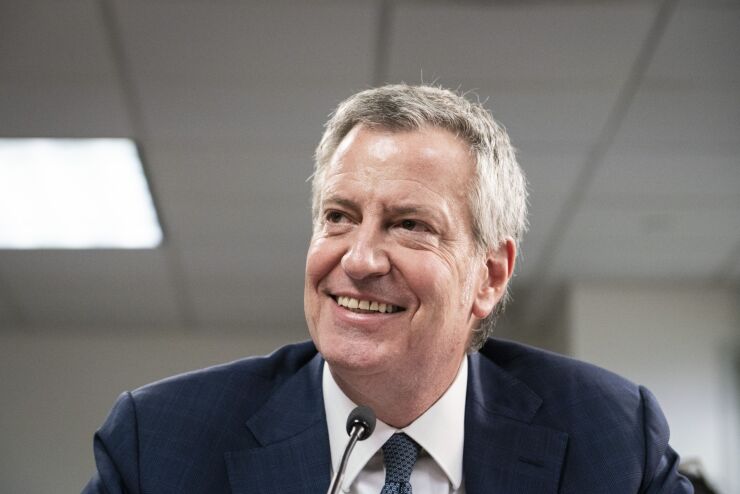New York Mayor Bill de Blasio’s administration will try to keep to its fiscal 2021 budget timetable despite the chaos surrounding the COVID-19 outbreak.
“Right now, I think both as a matter of statute and as a matter of trying to keep this city functioning, I intend to keep to the budget process on calendar,” de Blasio told reporters in the City Hall Blue Room Monday.

Earlier in the day, Comptroller Scott Stringer
Stringer cited significant projected losses in entertainment, hotel, restaurant, travel and tourism while the city is virtually shuttered.
“That might change at some point. I mean, we are, you know, a month or so out,” de Blasio said. “I think we have a very real possibility of keeping it on track. So until I feel otherwise, I'll stay there. "
The mayor released his $95.3 billion
“I don't want to predict the number. I could be up or down,” de Blasio said. “I mean, we first of all have to look at the revenue we had before all of this hit and then we have to look at the revenue impact of this. And that's going to be ever changing. I think it's way too early to determine how we're going to adjust the budget.”
De Blasio earlier in the year struck a cautionary tone, citing the specter of reimbursement cuts from the state, which is looking to close a $6 billion Medicaid gap.
“The state doesn’t have much of a rainy-day fund and the city doesn’t, either,” said Howard Cure, director of municipal bond research for Evercore Wealth Management.
According to the watchdog Citizens Budget Commission, had the city committed to achieving efficiency savings of just 1% of city-funded spending annually since fiscal 2015, FY21 budget would be $2 billion less. Average annual budget growth, the CBC said, would have been 4.7% instead of 5.2%.
Moody’s Investors Service rates the city’s general obligation bonds Aa1, while S&P Global Ratings and Fitch Ratings both rate the city's GOs AA. All three assign stable outlooks.
Stringer suggested a target of 4% of city tax levy-funded agency spending with exceptions for social service agencies, Department of Health and Mental Hygiene and Health + Hospitals.
“The city runs Health + Hospitals and the comptroller — and rightly so — is not touching it,” Cure said. “You could see bigger deficits at H+H and other social service agencies.”
President Trump on Friday declared a national emergency related to the virus.
“We need the hospital facilities, we need the testing, we need the personnel, we need the supplies,” de Blasio said. “Ventilators are a great example. You know, we are struggling right now to increase the number of ventilators in New York City. We're having some success.
“But we're trying our best to find new ventilators and competing with all sorts of other localities. And yet our need is much greater than many other places. Why is it catch as catch can? Why is it, you know, survival of the fittest instead of the federal government says, hold it everyone?”





